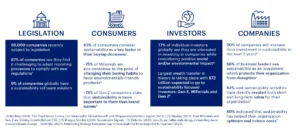Once a year, Sphera interviews hundreds of sustainability professionals worldwide and across multiple industries on the status of Scope 3 emissions reporting. Scope 3 reporting provides the broadest possible view of all emissions across a company’s value chain. This expansive scope means they are the hardest to measure and reduce and can represent up to 75% of a company’s carbon footprint.
This year, Sphera experts saw a significant rise in the number of companies reporting Scope 3 emissions despite a general decline in global regulatory pressures.
Even with rollbacks of the U.S. SEC climate disclosure rule and the imminent proposal of the EU Omnibus Package that eases reporting obligations, large corporations continued to report that they’re pressing forward with emissions reduction plans. Even more surprising, they continued reporting on a voluntary basis, opting for transparency over obligation.
According to the Sphera 2025 Scope 3 Report, 87% of respondents who report on emissions do so voluntarily, with a growing number including Scope 3 data in their disclosures. Even without binding legal requirements, organizations recognize the strategic, reputational and operational value of managing their complete carbon footprint.
If there’s less pressure to collect and record these difficult emissions records, why are more companies doing it? More importantly, if you’re not doing the same, what are you missing?
From obligations to opportunity
This commitment to voluntary disclosure becomes even more significant when considering total emissions reporting.
According to our report, 79% of companies now report on Scopes 1, 2 and 3, up from 52% in 2024, a 27-point year-over-year increase. Nearly 73% of businesses that don’t yet report on Scope 3 intend to do so soon, with 47% of non-reporting companies planning to begin within two years and another 26% intending to but without established timelines.
What’s driving this voluntary commitment? Companies that were once driven by obligation are now motivated by opportunity. They recognize that Scope 3 disclosure isn’t simply a compliance exercise — it’s a strategic advantage that builds consumer trust, strengthens stakeholder relationships and creates long-term value.
Here are five reasons sustainability experts are increasing their efforts on Scope 3 emissions reporting.
1. Stakeholder pressure demands transparency
Stakeholder voices have never been louder or more influential in corporate decision-making. Nearly half (46%) of survey respondents indicated that customers and other stakeholders are requesting emissions data, while 30% say they’ve been asked to set emissions-reduction targets.
And they’re right, according to a recent study by PwC, 83% of consumers factor in a company’s sustainability practices before making a purchase. Nearly three quarters of Millennials favor environmentally-friendly products, while Gen Z consumers consider sustainability more important than a recognizable brand. Nearly the same percentage of investors cite similar preferences.

This pressure extends beyond customers to include investors, communities and business partners who increasingly view comprehensive emissions data as essential for making informed decisions. Companies are finding that proactive disclosure strengthens relationships and builds trust across their entire ecosystem.
For these companies, transparency is no longer optional; it’s become a prerequisite for maintaining competitive relationships and securing future business opportunities.
2. Preparation for future regulatory requirements
While immediate regulatory pressure may have eased, forward-thinking companies understand that reporting requirements will inevitably return and expand. Many organizations, particularly large corporations and those with operations in the EU, remain subject to legal reporting requirements and recognize that their value chain partners may still face regulations.
Preparation extends beyond compliance readiness. Companies are building internal capabilities and data management systems now, rather than scrambling when mandatory disclosures resume or expand. This proactive approach enables organizations to refine their processes, identify data gaps and establish supplier relationships necessary for comprehensive Scope 3 reporting.
3. Embedded sustainability culture drives continuous improvement
For many organizations, sustainability has become part of their DNA. European companies continue to lead in emissions reporting across all three scopes. Of the 50% of surveyed companies setting sustainability-related targets like GHG emissions reduction and net-zero commitments, 55% are headquartered in Europe.
This embedded culture of sustainability goes beyond reporting. By incorporating risk management across the value chain, companies can identify potential vulnerabilities and opportunities.
In his recent book Sustainable Success, Sphera CEO Paul Marushka compares sustainability to historical merchant cultures that understood the importance of protecting trade routes. “Empires and armies were only as strong as their supply chains,” he wrote. Modern day supply chains likewise endure treacherous waters stirred by pandemics, wars and politics.
4. Risk management and supply chain resilience
Companies with supply chains and value networks that are exposed to disruptions use emissions data to identify potential vulnerabilities before they become costly problems.
This risk management approach extends to financial planning and capital allocation. Investors and lenders increasingly factor disruption risks into their decisions, making comprehensive emissions data essential for securing favorable terms and maintaining access to capital markets.
5. Financial performance and data quality evolution
Building sustainability into business processes is rapidly becoming a core component of business performance. Forward-thinking companies are collecting and using data to reduce pressure on their operations, mitigate future liabilities and make meaningful sustainability decisions that drive financial returns.
A significant trend emerges in how companies approach data collection. The survey shows that 65% of respondents now combine multiple data types in a hybrid reporting approach, representing a 17-point increase from 2024’s 48%.
This shift reflects growing sophistication in sustainability management. While spend-based data provides an easy entry point, companies recognize its limitations for accurate emissions assessment and strategic decision-making.
Companies that report on Scope 3 emissions are better positioned to influence the carbon emissions of their operations and their suppliers while building trust with their stakeholders and preparing for the challenges ahead.
The journey requires time and investment, but the returns help companies avoid unplanned costs, free up working capital, save on insurance and improve response times.
For a deeper dive into Scope 3 reporting, read the Sphera 2025 Scope 3 emissions report and check out our ongoing Scope 3 Summer Webinar series.






